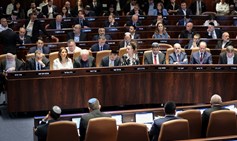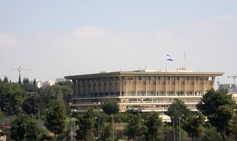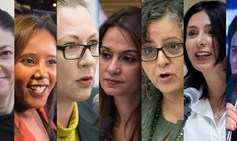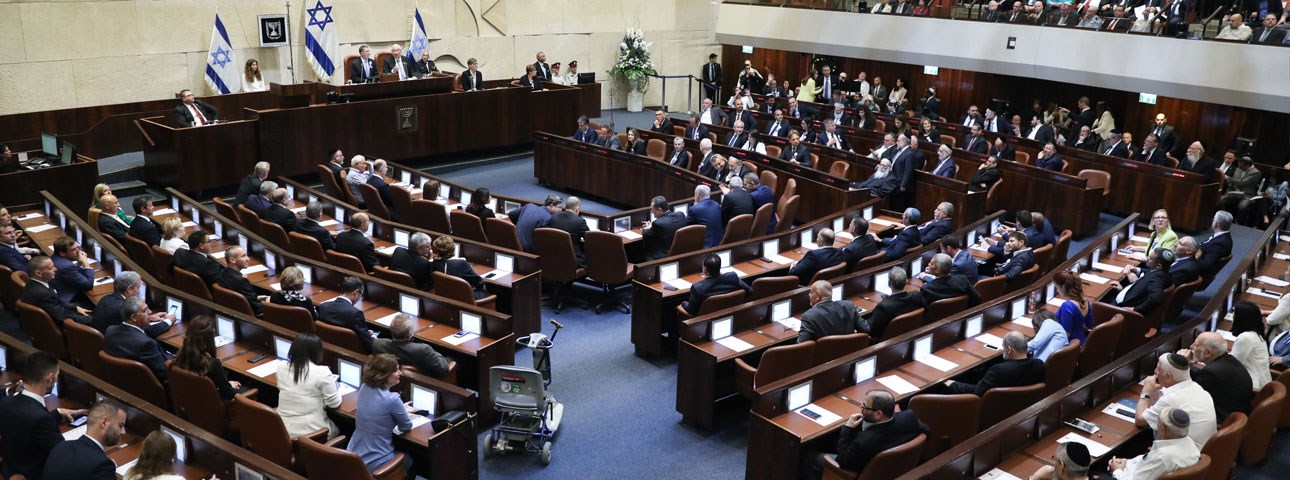

Publications Regarding Knesset
Articles

Israel's State Budget is Directly Linked to Dissolution of Knesset and Elections
Written By: Dr. Assaf Shapira
Why is the Knesset automatically dissolved if the budget is not approved? When was this rule established, and when was the last time elections were brought forward due to the failure to pass the state budget? All the answers.

Special Review of Public Opinion Ahead of 2026 Elections (IDI's Israeli Democracy Index)
Following the release of the IDI's Israeli Democracy Index earlier this week, we're pleased to present the findings of a special chapter on Israeli public opinion ahead of 2026 national elections in Israel.

A Note to Members of Knesset: Immunity Does Not Apply to Police Investigations
Written By: Prof. Suzie Navot, Dr. Moran Kandelshtein-Haina
Though Members of Knesset are granted immunity from prosecution under the law, legal precedent makes clear that this immunity does not apply to the stage of criminal investigations.

One Minister Wearing Five Hats
Written By: Prof. Suzie Navot, Dr. Moran Kandelshtein-Haina
With Justice Minister Yariv Levin's recent appointment as Acting Minister of Jerusalem and Jewish Heritage, he now holds five ministerial portfolios. This situation, with Levin and other ministers, is harmful to public interest and raises important legal and procedural questions.

Replacing a Knesset Committee Chair
Written By: Avital Friedman
As the Likud party seeks to replace MK Yuli Edelstein as Chair of the Knesset Foreign Affairs and Defense Committee, this Q&A lays out everything you need to know about the role of a Committee Chair, and the the replacement process and history relevant to the current situation.

What is the “MK Expulsion Law?"
Written By: Dr. Amir Fuchs, Avital Friedman
The Knesset passed Amendment 44 in 2016 to regulate the possibility of impeaching MK's. An MK can be expelled if the Knesset finds that his or her actions constituted incitement to racism or support of an armed struggle against Israel.

In a World Turned Upside Down, Israeli Politics is Business as Usual
Written By: Prof. Ofer Kenig, Dr. Dana Blander
The events of October 7, the judicial overhaul, continuous war, murderous violence on the streets, a spiraling cost of living—none of these have been enough to destabilize the coalition. Will it be the conflict over drafting yeshiva students that ultimately brings down the Netanyahu government?

Everything You Need to Know About Dissolving the Knesset
Written By: Dr. Assaf Shapira
What is the process and timing involved in dissolving Knesset and initiating elections? What happens between a Knesset dissolution and the forming of a new government? Is Israel's process typical compared to other countries? All your questions answered about dissolving Israeli Knesset.

The Government Against the Rule of Law
Written By: Dr. Guy Lurie
The Israeli government's current efforts to dismiss the head of the director of the Shin Bet and the Attorney General, alongside its attempt to restructure the Judicial Selection Committee, reflect a broader shift toward subordinating legal and security institutions to political authority, raising concerns about the erosion of the rule of law and the future of democratic governance in Israel.

Women’s Representation in Israeli Politics: Analysis for 2025
Written By: Prof. Ofer Kenig
An analysis and international comparison of women's representation in the Israeli political arena.

76 Years of the Knesset | Test Your Knowledge
Written By: Prof. Ofer Kenig, Dr. Chen Friedberg, Avital Friedman
The Knesset, Israel's parliament, marks 76 years today. Over the decades, it has shaped the nation's laws, policies, and political landscape, evolving alongside Israel and the modern world. How much do you know about the Knesset and its history? Test your knowledge.

Does the Minister of Justice Have Immunity?
Written By: Prof. Suzie Navot, Dr. Moran Kandelshtein-Haina
In response to a petition filed against him regarding the intentional delay in appointing a president of the Supreme Court, Minister Levin claimed that it is impossible to sanction him because he enjoys “substantive immunity.” A closer examination of the law reveals that this is not the case.

New Bill Proposed Expands the Criteria for Disqualification of Electoral Lists
Written By: Dr. Amir Fuchs
A new bill proposes to amend Basic Law: The Knesset, by expanding the criteria that would disqualify candidates and lists from participating in elections based on minimal and even past expressions, interpreted as sympathy or support for armed struggle of an enemy state or terrorist organization.

Could Sderot Have the Same Standing as Tel Aviv? Perhaps If We Reform the Electoral System
Written By: Dr. Assaf Shapira, Prof. Gideon Rahat
Israel is the only OECD member that has neither regional elections nor a personal element in the electoral system. This is not simply a technical issue but has far-reaching implications relating to the quality of representation and the obligation elected officials have toward their voters.

The Knesset in Numbers
Written By: Dr. Assaf Shapira, Avital Friedman, Dr. Chen Friedberg
The 25th Knesset has recently completed its summer session, which began on May 19, 2024 and concluded on Sunday July 28, 2024. This article reviews and analyzes various aspects of the Knesset’s work during this period, comparing them to the previous two full sessions of the 25th Knesset.

Judicial Selection in Israel in the Aftermath of the Judicial Overhaul
Written By: Dr. Guy Lurie
With the outbreak of the war in October 2024, the Prime Minister announced that he was halting all legislation relating to the judicial overhaul, however, various government actions raise questions regarding its intentions in relation to the overhaul and whether it might be trying to advance it by other means beyond legislation.

The Judicial Overhaul and Anti-Democratic Initiatives - Part II
Written By: Adv. Anat Thon Ashkenazy, Adv. Daphne Benvenisty
IDI experts outline the initiatives and measures undertaken by the government that, taken together, constitute a concentrated effort undermine Israel's democratic institutions. At the core of these efforts is a dramatic attempt to weaken the status of the Attorney General; increased politicization of the police; continued undermining of the independence of the judiciary and more.

The Judicial Overhaul and Anti-Democratic Initiatives
Written By: Adv. Anat Thon Ashkenazy, Adv. Daphne Benvenisty
Judicial overhaul initiatives, along with other anti-democratic measures, have continued to be promoted by the government and the coalition in the Knesset. This document outlines the various actions taken in government that weaken the Israeli judiciary and democracy at large.

The Israeli Democracy Index 2023
The IDF and local authorities received the highest trust ratings from the Jewish public, while the political institutions were at the bottom with the lowest level. The post October 7th survey also saw a substantial increase in trust in the Israeli police.

The Invisible Safeguards of Judicial Independence in the Israeli Judiciary
Written By: Dr. Guy Lurie
The Israeli democracy regulates the operation of the judiciary through the constraints of formal rules that check the political actors, the individual judges, and the judiciary. Yet beyond these formal rules, informal institutions and practices are sometimes equally important in the operation of the judiciary, as they are in any constitutional system. This article discusses informal institutions that are important in the operation and independence of the Israeli judiciary.

Women’s Representation in Israeli Politics: Analysis for 2024
Written By: Prof. Ofer Kenig
Between 1996 and 2015, there was a real improvement in women's representation in the Knesset. Since 2015, however, it seems this upward trend has stalled and female legislative representation is faltering, especially compared to other democracies.

What Was the Supreme Court’s Ruling on the Revocation of the Reasonableness Doctrine? Eight Key Points
Written By: Prof. Amichai Cohen, Dr. Amir Fuchs, Dr. Guy Lurie
The Supreme Court's ruling to strike down the amendment made to the Basic Law: The Judiciary and reinstate the Standard of Reasonableness is a landmark decision on an issue that has been exceptionally divisive within Israeli society. Will this lead to a constitutional crisis? 8 Key points from IDI's experts examining the court's decision.

The Verdict is in: Checks and Balances are Here to Stay
Written By: Prof. Suzie Navot
This decision refocused our attention not only on the specific law it struck down but also on the unfinished business of completing our country’s constitutional framework

Coalition and Political Funds: Main Conclusions
Written By: Prof. Karnit Flug, Tzachi David
Coalition funds have been part of the budget-making progress for years. This study examines the trends in the use of these funds under the last three governments. One can see that the volume of coalition funds has grown up to fourfold within two Governments and that their breakdown has been less professional and more directed to interest groups.

61 Cats Guarding the Cream
Written By: Dr. Amir Fuchs
The optimistic hope that the majority will not take advantage of its power to perpetuate its rule is akin to leaving the cream to be guarded by 61 cats. The temptation is just too strong.

The “Norwegian Law”: Problematic, Yes—But a Necessary Evil
Written By: Dr. Assaf Shapira
The “Norwegian Law” has many troubling and significant downsides - however Israel's parliament is simply too small.

Disbanding of the Religious Zionism Faction
Written By: Dr. Assaf Shapira
Joint lists that fall apart quickly often do more harm than good, heightening political divisiveness and instability

A Preview of the 25th Knesset
Written By: Prof. Ofer Kenig
Fourteen days after the election, the 25th Knesset will be sworn in. This is the fifth Knesset inauguration in less than 3½ years—testimony to the political crisis which Israel is undergoing. How many new MKs are there? Will the stagnation in female representation continue? How many MKs have a background in local government?

The 24th Knesset in Numbers
Written By: Dr. Chen Friedberg, Avital Friedman
The 24th Knesset has dispersed, around a year and a quarter since it was sworn in. The most prominent finding in the following review is that this Knesset continued the trend set by its predecessor: Both saw a dramatic increase in the number of private members’ bills put forward, and a dramatic reduction in the proportion of such bills that passed a third reading and became laws.

Who Does the Seat in Parliament Belong to The Party Faction or its Individual Member?
Written By: Dr. Assaf Shapira, Avital Friedman
Israel has a closed electoral system, so that on election day, the country’s citizens do not vote for individual representatives, but rather-for a list, which subsequently evolves into a faction in the Knesset. What does that mean in terms of balancing the power between the party and individual parliament members?

Constructive Motions of No-Confidence: Q&As
Written By: Prof. Gideon Rahat, Dr. Chen Friedberg
IDI experts Prof. Gideon Rahat and Dr. Chen Friedberg explain what a Constructive No-Confidence Vote means for the stability of Israel’s government.

Women in Israeli Politics: 2022
Written By: Prof. Ofer Kenig
As we mark International Women’s Day, there are a record number of women are in the Knesset (35) and in the government (9) but most senior government positions are still held by men.

Happy 73rd Birthday, Knesset!
Written By: Prof. Ofer Kenig
As the Knesset, Israel’s legislature, marks its 73rd birthday, IDI is taking the opportunity to reflect on two of its characteristics; the social composition of its membership and its size as compared with other countries.

Women's Representation in the Knesset and the Government: An Overview
Written By: Dr. Assaf Shapira, Prof. Ofer Kenig, Avital Friedman
Women still constitute less than 30% of all Knesset members and the percentage of female cabinet members in the government has never risen above 23.5%

How Many Knesset Members Have Lasted in Politics Since 2009?
Written By: Prof. Ofer Kenig
The data reflects a very high turnover rate in Israel's political system. This has both positive and negative aspects. On the one hand - a robust political system should be refreshed - but it can also be a symptom of a "sick" system

Halting Legislation in the Knesset and No Government Meetings
Written By: Dr. Amir Fuchs
With the exception of issues related to the coronavirus pandemic, this Knesset has passed almost no legislation, and this government has met only rarely.

Disbanding the Knesset for Lack of an Approved Budget Makes No Sense
Written By: Dr. Assaf Shapira
This law, unique to Israel, was meant as an incentive to avoid budgetary deadlock. Today, it sows instability.

IDI Supports Enacting the “Norwegian Law”
Knesset members should be available for parliamentary legislation and oversight

The Override Clause—Canada and Israel
Written By: Prof. Tsvi Kahana
Democracies ensrhine onstitutional rights, and give the court the power to protect them, out of concern that the legislator may act rashly, or even tyrannically - so then why should we "override" the court's authority - when we have no other constraints

Parliamentary Immunity: Explainer
Written By: Dr. Amir Fuchs, Dr. Assaf Shapira
After two MKs - Ofer Kasif and Ahmad Tibi - were allegedly involved in violence against police officers, IDI experts Dr. Amir Fuchs and Dr. Assaf Shapira explain the reasoning for and parameters of parliamentary immunity.

